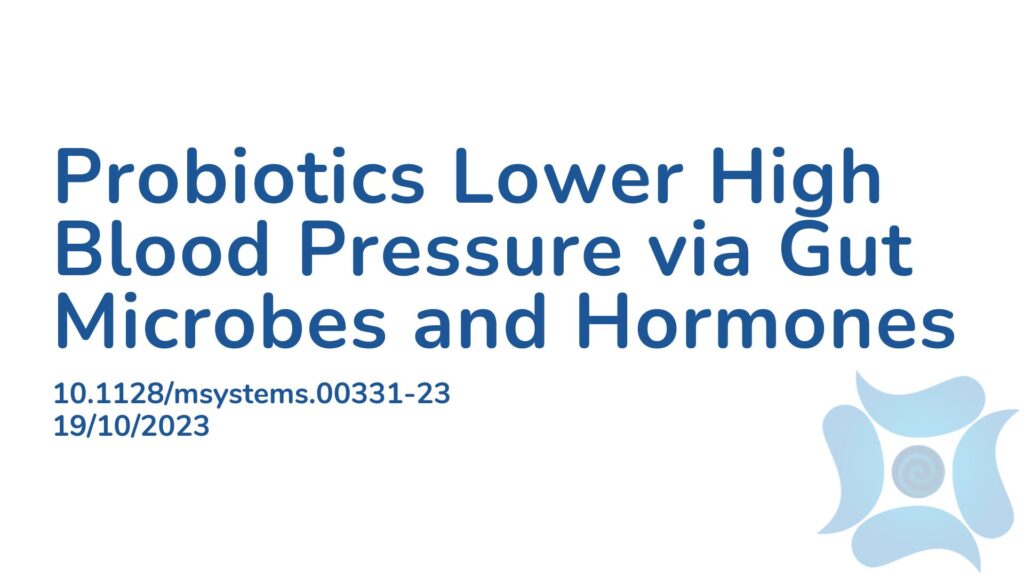Summary:
High intake of fructose, which is a type of sugar usually found in fruit, is a significant risk factor for hypertension. While various probiotics have been reported to lower blood pressure, the mechanism behind this is poorly understood. This study examined the impact of Bifidobacterium lactis M8 and Lactobacillus rhamnosus M9 on blood pressure by analysing the genome of the gut in mice subjected to a high-fructose diet. After a 16-week intervention, the probiotics reduced blood pressure by approximately 20% due to changes in other bacterias. The authors also monitored steroid hormone synthesis, suggesting that probiotics play a potential role in influencing blood pressure by altering steroid hormone levels. In summary, the findings shed light on how probiotics alleviate high blood pressure through interactions with specific gut microbes and hormones. Elevated blood pressure affects 40% of adults, contributing to increased cardiovascular disease risk and death globally. Understanding the gut microbiome role in high blood pressure could provide valuable insights for prevention. Therefore, utilizing dietary strategies, such as probiotics, to maintain healthy blood pressure levels holds considerable significance.
Abstract:
High-fructose intake is one of the high-risk factors for hypertension. Several probiotics have been reported to reduce high blood pressure (BP) via modulating gut microbiota, but the mechanism of the antihypertensive effect of probiotics is insufficiently understood. Herein, we investigated the antihypertensive effect of Bifidobacterium lactis M8 and Lactobacillus rhamnosus M9 based on the integrative analysis of gut metagenome and serum metabolome in high-fructose-treated mice. After 16-week intervention, M8 and M9 significantly reduced the median blood pressure by 16.92% and 15.39% in SBP, and 18.56% and 20.62% in DBP, respectively. Metagenomic analysis revealed that the increased Lawsonia and Pyrolobus, and reduced Alistipes and Alloprevotella levels were tightly correlated with lowered BP. Functionally, the decreased pathways of “base excision repair” (BER) and “D-glutamine and D-glutamate metabolism” were associated with BP reduction. Metabolomics data analysis further revealed that the probiotic interventions regulated vascular smooth muscle contraction, serotonergic synapse, cholinergic synapse, and lipid and vitamin metabolism in BP control. Additionally, association analyses indicated a strong negative correlation between Alistipes and “steroid hormone biosynthesis,” suggesting that Alistipes could affect blood pressure by changing steroid hormone levels. In conclusion, our findings indicate that the probiotic efficacies in alleviating hypertension are linked to specific gut microbes and metabolic pathways, which provide a potential mechanistic understanding of probiotics modulated blood pressure, paving the way for future assessment of the therapeutic potential of probiotics in hypertension management. Elevated blood pressure affects 40% of the adult population, which accounts for high cardiovascular disease risk and further high mortality yearly. The global understanding of the gut microbiome for hypertension may provide important insights into the prevention. Bifidobacterium lactis M8 and Lactobacillus rhamnosus M9 originated from human breast milk, were able to decrease blood pressure, and modified metabolites in a high fructose-induced elevated blood pressure mouse model. Moreover, we found there was a close relationship between unexplored gut microbes and elevated blood pressure. Also, subsequently, the cross-link was explored among gut microbes, metabolites, and some metabolic pathways in gut microbial environment through introducing novel prediction methodology and bioinformatic analysis. It allowed us to hypothesize that probiotics can prevent elevated blood pressure via gut microbiota and related metabolism.Thus, utilization of dietary strategies (such as probiotics) to maintain the blood pressure level is of crucial importance.
Article Publication Date: 19/10/2023
DOI: 10.1128/msystems.00331-23



